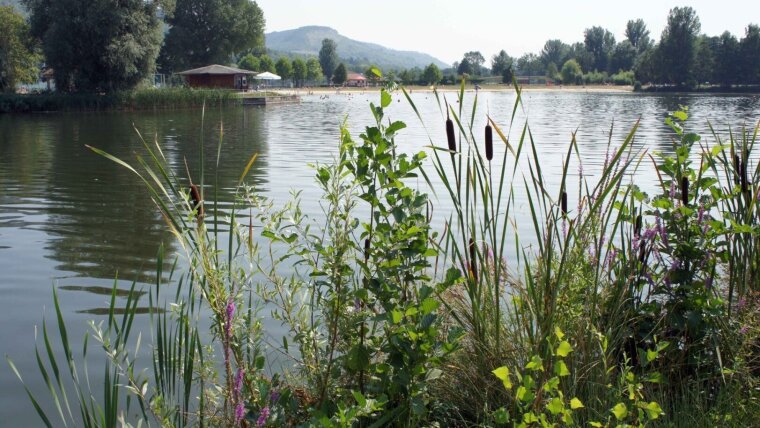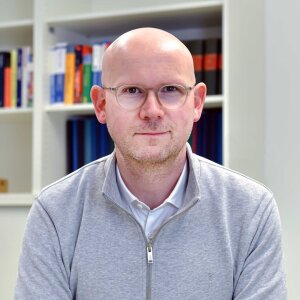
Water is an essential commodity – we can’t live without clean water. Despite posing an existential threat to society as a whole, the issue of water scarcity is not yet anchored in public discourse – even though many people in Germany should remember the extremely dry summer of 2022. That’s why the Thuringian Water Innovation Cluster (»ThWIC«), in addition to developing new water technologies, wants to raise public awareness on the topic of water and promote a more sustainable use of our precious resource. In our interview with Dr Karsten Gäbler, he tells us how the innovation cluster is going to tackle this challenge and what role the future sustainability strategy of the University of Jena will play in the cluster.
Interview by Laura Weißert
What does the Thuringian Water Innovation Cluster (»ThWIC«) have to do with the sustainability strategy envisaged by the University of Jena?
One of the key goals of the sustainability strategy will be to create a more tight-knit network for the research work carried out in Jena on major societal challenges. Take, for example, the Sustainable Development Goals that the United Nations set out in the 2030 Agenda: The research conducted by many scientists at our university is contributing to the 17 goals in one way or another. In launching the »ThWIC« water cluster, we have created a new platform that can be used to highlight the links between the individual goals based on water-related issues. Because clean water is not just a Sustainable Development Goal in its own right – it is also related to issues such as food security, health, energy and consumption.
What exactly does that mean for the cluster’s research activities?
The concepts of »interdisciplinarity« and »transdisciplinarity« are very important to us and are also emphasized in the sustainability strategy. It is a truism that the great problems of our time cannot be pigeonholed into rigid scientific disciplines. In the »ThWIC« cluster, we are therefore trying to combine water research in the field of environmental chemistry, which is very well established in Jena, with sociological and literary research on water-related issues. And computer science is also involved with completely new approaches to managing water-related data.
We want to create a more favourable environment for interdisciplinary research in the cluster. Interdisciplinary cooperation takes more time and requires completely different forms of communication, because those involved have very different approaches to the topic. The concept of »transdisciplinarity« is about what the university can contribute to ensure that we as a society achieve the transition to a more sustainable world. In our cluster, for example, collaboration with companies plays a huge role, and we also involve actors from politics and civil society. This cooperation also brings its own challenges, so we want to raise awareness for this and provide people with the qualifications they need. We can only answer complex questions together – we want to ensure that everyone is prepared for that and create spaces for discourse.
Dr Karsten Gäbler is coordinating projects within the »ThWIC« water cluster and, as a member of the Senate Working Group on Sustainability, he is also involved in the development of a sustainability strategy for the University of Jena.
Image: Jürgen Scheere (University of Jena)How are you fostering interdisciplinarity in teaching?
Starting in the 2023/24 winter semester, we will be introducing a »ThWIC Certificate«, whereby students will be able to practise interdisciplinary and transdisciplinary work on sustainability issues. Water will play a role, but other topics will also be covered. Our primary concern is to introduce students to interdisciplinary thinking and working as early as possible. If, for example, a sociology student and an environmental chemist meet in a seminar, this can present quite a challenging clash of scientific cultures.
We want students to be able to learn to appreciate different approaches, listen carefully and respond constructively to the views of others, outside of their usual courses. Among other things, we will be offering compulsory integration events for all certificate participants, where we will answer questions such as »What is disciplinary identity?«, »How can I translate between different disciplines?«, and »What is sustainability?«.
In the future, we want to develop this into a continuing education programme aimed at people from small and medium-sized enterprises, in order to provide them with the qualifications they need to deal with the topic of water and transdisciplinary cooperation. The aim is to create a comprehensive teaching and learning platform on the subject of interdisciplinary/transdisciplinary water research for sustainability.
The university’s sustainability strategy also envisages ways of making research more accessible to the general public or even involving citizens in research. How is the »ThWIC« water cluster planning to do that?
To name a few examples, we have launched an augmented reality project with the aim of making water infrastructure visible – that could serve as an introduction to the topic. Another project is concerned with individual water consumption. The aim of the »Public Water Science« project is to broaden society’s knowledge of water – we call it »water literacy« – through outreach activities. We want to organize »Water Days« in schools, where young people will be able to do experiments and play around with the topic of water. There will also be a mobile water pavilion that can be driven to corporate events – and it will also make an appearance in public spaces, such as during campaign days in the city. There you will find information material on the topic of water, useful contacts and perhaps even interactive formats in the future. In the long term, we would like to succeed in not only raising public awareness of water issues, but also in conducting water research together with members of the public.
